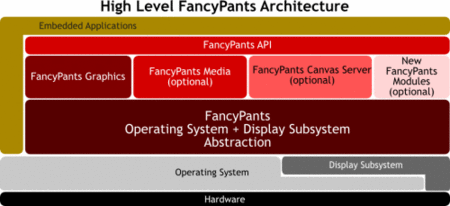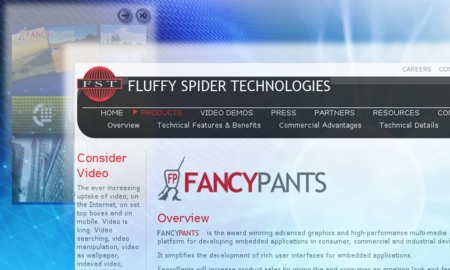Browser, graphics stack tag-team eyes Linux devices
Aug 22, 2007 — by LinuxDevices Staff — from the LinuxDevices Archive — 1 views Fluffy Spider Technologies (FST) has ported Opera Software's Opera browser to its FancyPants embedded graphics stack. The companies will jointly market the combined stack, which initially supports Linux on ARM, to developers of smartphones, set-top boxes, POS (point-of-sales), electronic signs, in-car systems, and… building automation equipment.
Fluffy Spider Technologies (FST) has ported Opera Software's Opera browser to its FancyPants embedded graphics stack. The companies will jointly market the combined stack, which initially supports Linux on ARM, to developers of smartphones, set-top boxes, POS (point-of-sales), electronic signs, in-car systems, and… building automation equipment.
FST's FancyPants is a lightweight, embedded graphics framework similar to Qt Core or GTK. With a storage footprint below 3MB, it nonetheless provides efficient multimedia performance and sophisticated special effects, according to the vendor. Supported effects include soft shadows, screen and image transitions, fades and wipes, 32-bit alpha blending, animations, glitter, color manipulation, scaling, rotation, and 3D folds.

FST's FancyPants graphics stack
FST's previous design wins with FancyPants include Linux-based payment terminals with integrated ads, and possibly also Qualcomm mobile phones. The company recently partnered with OKLabs, a vendor of open source real-time microkernels, and with Nissin Systems, an embedded service provider based in Japan.

Two applications using the “CanvasServer” module, which is also providing the window border for the Opera browser
(Click to enlarge)
Opera Software's Opera browser is a lightweight web browser that implements a large subset of current web standards, including HTML, CSS, Javascript, DHTML, and so forth, along with support for some de-facto standards like Adobe Flash. Opera markets its browser as being able to bring the “full web” to any device.
In addition to serving as a web browser for low-resolution devices like phones and TVs, Opera can itself serve as a user interface framework, via widget technology aimed at letting companies use web standards to implement device control interfaces. One recent design win is a Linux-based videophone that can dial numbers from web pages.
Both Opera and FST tout their products as portable and OS-agnostic. And, both appear to be strongly focused on mobile phones. The Opera browser has already shipped in about 100 million mobile phones, FST said. Meanwhile, FST boasts of several wireless carriers on its customer list, which includes Toshiba, payment processing system vendor VeriFone, Ericsson, HP, Optus, Vodafone, and GEC.
FST CEO Robi Karp stated, “FancyPants [helps] OEMs create embedded applications with a breathtaking look and feel.”
Scott Hedrick, senior VP of Opera Software, added, “FancyPants's plug-in architecture readily delivers the benefits of Opera, which is available for a wide range of mobile handsets.”
Availability
FST said its port of Opera to FancyPants “initially focuses” on embedded Linux, with ports to other OSes “subject to specific business opportunities.” The port can be demonstrated on PC desktops, the company added.
This article was originally published on LinuxDevices.com and has been donated to the open source community by QuinStreet Inc. Please visit LinuxToday.com for up-to-date news and articles about Linux and open source.